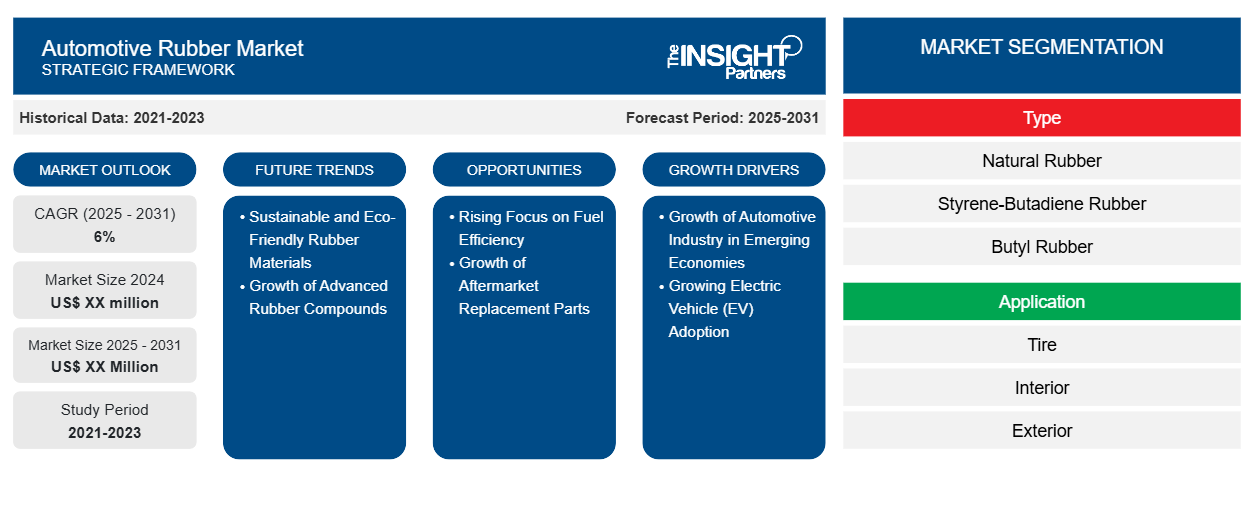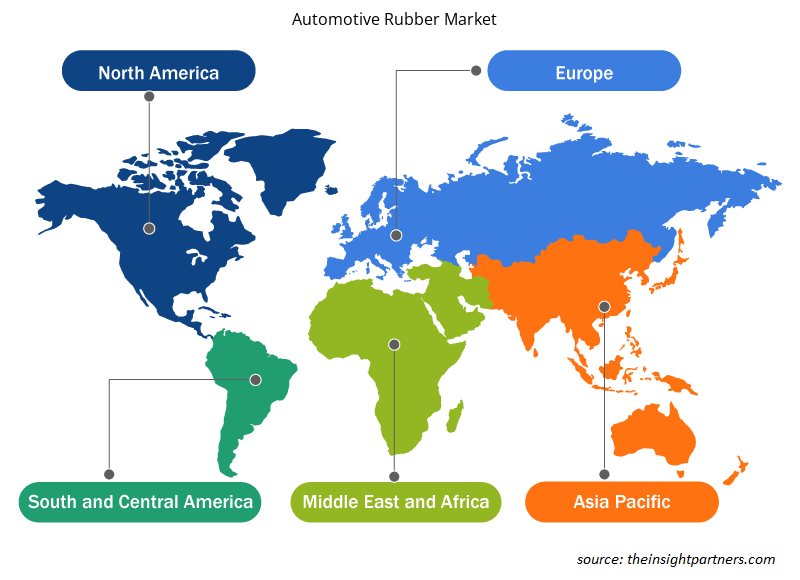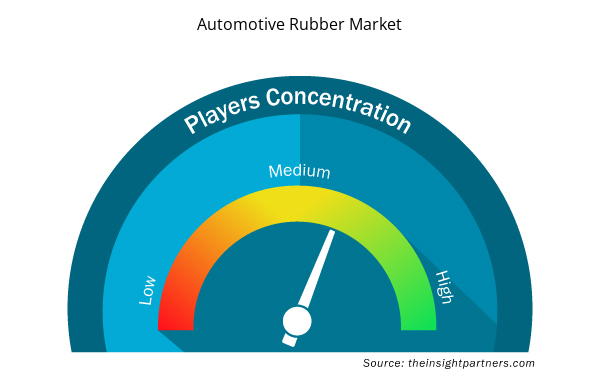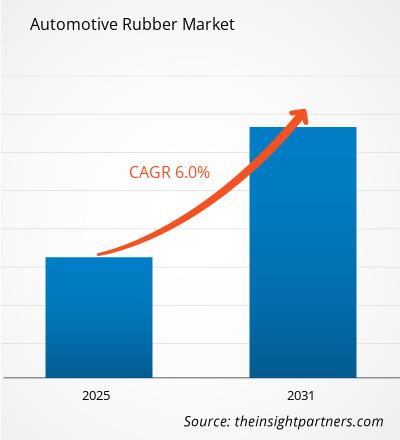The Automotive Rubber Market is expected to register a CAGR of 6% from 2025 to 2031, with a market size expanding from US$ XX million in 2024 to US$ XX Million by 2031.
The report is segmented by Type (Natural Rubber (NR), Styrene-Butadiene Rubber (SBR), Butyl Rubber (IIR), Poly Butadiene Rubber (BR), Neoprene Rubber/Chloroprene Rubber, Nitrile Butadiene Rubber (NBR), Others) . The report further presents analysis based on, Application (Tire, Interior, Exterior, and Under the Hood). Based on Based on Vehicle Type report is segmented into (Passenger Vehicles, Light Commercial Vehicles (LCV), Heavy Commercial Vehicles, and Two Wheelers and Others) The global analysis is further broken-down at regional level and major countries. The Report Offers the Value in USD for the above analysis and segments.
Purpose of the Report
The report Automotive Rubber Market by The Insight Partners aims to describe the present landscape and future growth, top driving factors, challenges, and opportunities. This will provide insights to various business stakeholders, such as:
- Technology Providers/Manufacturers: To understand the evolving market dynamics and know the potential growth opportunities, enabling them to make informed strategic decisions.
- Investors: To conduct a comprehensive trend analysis regarding the market growth rate, market financial projections, and opportunities that exist across the value chain.
- Regulatory bodies: To regulate policies and police activities in the market with the aim of minimizing abuse, preserving investor trust and confidence, and upholding the integrity and stability of the market.
Automotive Rubber Market Segmentation
Type
- Natural Rubber
- Styrene-Butadiene Rubber
- Butyl Rubber
- Poly Butadiene Rubber
- Neoprene Rubber/Chloroprene Rubber
- Nitrile Butadiene Rubber
Application
- Tire
- Interior
- Exterior
- Under the Hood
Customize This Report To Suit Your Requirement
You will get customization on any report - free of charge - including parts of this report, or country-level analysis, Excel Data pack, as well as avail great offers and discounts for start-ups & universities
Automotive Rubber Market: Strategic Insights

- Get Top Key Market Trends of this report.This FREE sample will include data analysis, ranging from market trends to estimates and forecasts.
Automotive Rubber Market Growth Drivers
- Growth of Automotive Industry in Emerging Economies: In the last few years, the automotive industry has been significantly growing across emerging economies such as Brazil, China, India, Mexico, and South Africa. With the increasing disposable income, the demand for both passenger and commercial vehicles is growing in developing countries. For instance, according to the Federation of Automobile Dealers Associations (FADA), in India, sales of passenger vehicles increased to 2,854,242 units in November 2023, compared with 2,409,535 units in November 2022. Similarly, according to the China Association of Automobile Manufacturers (CAAM), the sales of commercial vehicles accounted for 18.3% year-on-year for September 2023 in China. These stats show the increasing demand for vehicles. The automotive industry also paved its way in Brazil and South Africa. According to the International Organization of Motor Vehicle Manufacturers (OICA), South Africa's automobile production increased by 24% to 555,889 units in 2022. According to the same source, Brazil was the largest manufacturer and exporter of light and commercial vehicles in 2023 in South & Central America. The country reported production of 2.3 million vehicles in 2022. Thus, the growth of automotive industries in emerging economies is expected to create lucrative opportunities for the automotive elastomers market growth.
- Growing Electric Vehicle (EV) Adoption: The rise in electric vehicle (EV) adoption is influencing the automotive rubber market. EVs require unique rubber components such as specialized seals, gaskets, and tires designed for enhanced efficiency and performance. The growth of EVs boosts the demand for advanced rubber materials that cater to the distinct needs of electric vehicles.
Automotive Rubber Market Future Trends
- Sustainable and Eco-Friendly Rubber Materials: The future of the automotive rubber market will be heavily shaped by sustainability. As environmental regulations tighten, demand for bio-based and recyclable rubber materials is expected to rise. Automakers will increasingly adopt eco-friendly alternatives to meet both consumer preferences and regulatory pressures for greener automotive solutions.
- Growth of Advanced Rubber Compounds: Advancements in rubber compounds will drive future market trends. High-performance rubber materials, such as those with improved heat resistance and durability, will be increasingly utilized in tires, seals, and gaskets. This trend is fueled by the growing demand for longer-lasting components and greater vehicle efficiency in the automotive industry.
Automotive Rubber Market Opportunities
- Rising Focus on Fuel Efficiency: The growing emphasis on fuel economy is quite favorably opening up prospects for growth of the automotive rubber industry. Because weight contributes considerably to fuel consumption, they are beginning to develop better lighter rubber products. Light weight rubber parts like seals and gaskets help in the overall performance and efficiency of the vehicle.
- Growth of Aftermarket Replacement Parts: The automotive aftermarket sector presents an opportunity for the rubber market. As vehicles age, there is an increasing demand for replacement rubber parts such as tires, gaskets, and seals. This trend offers significant growth potential for manufacturers specializing in high-quality replacement rubber components for maintenance and repair.
Automotive Rubber Market Regional Insights
The regional trends and factors influencing the Automotive Rubber Market throughout the forecast period have been thoroughly explained by the analysts at Insight Partners. This section also discusses Automotive Rubber Market segments and geography across North America, Europe, Asia Pacific, Middle East and Africa, and South and Central America.

- Get the Regional Specific Data for Automotive Rubber Market
Automotive Rubber Market Report Scope
| Report Attribute | Details |
|---|---|
| Market size in 2024 | US$ XX million |
| Market Size by 2031 | US$ XX Million |
| Global CAGR (2025 - 2031) | 6% |
| Historical Data | 2021-2023 |
| Forecast period | 2025-2031 |
| Segments Covered |
By Type
|
| Regions and Countries Covered | North America
|
| Market leaders and key company profiles |
Automotive Rubber Market Players Density: Understanding Its Impact on Business Dynamics
The Automotive Rubber Market market is growing rapidly, driven by increasing end-user demand due to factors such as evolving consumer preferences, technological advancements, and greater awareness of the product's benefits. As demand rises, businesses are expanding their offerings, innovating to meet consumer needs, and capitalizing on emerging trends, which further fuels market growth.
Market players density refers to the distribution of firms or companies operating within a particular market or industry. It indicates how many competitors (market players) are present in a given market space relative to its size or total market value.
Major Companies operating in the Automotive Rubber Market are:
- BASF SE
- Bridgestone India Automotive Products Pvt. Ltd.
- DuPont de Nemours, Inc.
- Lanxess
- Pirelli and C. S.p.A
Disclaimer: The companies listed above are not ranked in any particular order.

- Get the Automotive Rubber Market top key players overview
Key Selling Points
- Comprehensive Coverage: The report comprehensively covers the analysis of products, services, types, and end users of the Automotive Rubber Market, providing a holistic landscape.
- Expert Analysis: The report is compiled based on the in-depth understanding of industry experts and analysts.
- Up-to-date Information: The report assures business relevance due to its coverage of recent information and data trends.
- Customization Options: This report can be customized to cater to specific client requirements and suit the business strategies aptly.
The research report on the Automotive Rubber Market can, therefore, help spearhead the trail of decoding and understanding the industry scenario and growth prospects. Although there can be a few valid concerns, the overall benefits of this report tend to outweigh the disadvantages.
- Historical Analysis (2 Years), Base Year, Forecast (7 Years) with CAGR
- PEST and SWOT Analysis
- Market Size Value / Volume - Global, Regional, Country
- Industry and Competitive Landscape
- Excel Dataset



Report Coverage
Revenue forecast, Company Analysis, Industry landscape, Growth factors, and Trends

Segment Covered
This text is related
to segments covered.

Regional Scope
North America, Europe, Asia Pacific, Middle East & Africa, South & Central America

Country Scope
This text is related
to country scope.
Frequently Asked Questions
#Rising Focus on Fuel Efficiency is expected to be the key market trends.
Based on type, natural rubber segment is expected to witness the fastest growth during the forecast period
Based on geography, Asia Pacific held the largest share of the automotive plastics market due to the well-established automotive industry across the region
Growing demand for automotive industry in emerging economies is driving the market growth
BASF SE, Bridgestone India Automotive Products Pvt. Ltd., DuPont de Nemours, Inc.are some of the key players operating in the automotive rubber market
The Automotive Rubber Market is estimated to witness a CAGR of 6% from 2023 to 2031
Trends and growth analysis reports related to Chemicals and Materials : READ MORE..
1.BASF SE
2.Bridgestone India Automotive Products Pvt. Ltd.
3.DuPont de Nemours, Inc.
4.Lanxess Aktiengesellschaft
5.Pirelli and C. S.p.A
6.Saudi Basic Industries Corporation
7.Shin-Etsu Chemical Co. Ltd.
8.The Goodyear Tire and Rubber Company
9.Toyo Tire and Rubber Co Ltd
10.Yokohama Rubber Company Ltd.

 Get Free Sample For
Get Free Sample For